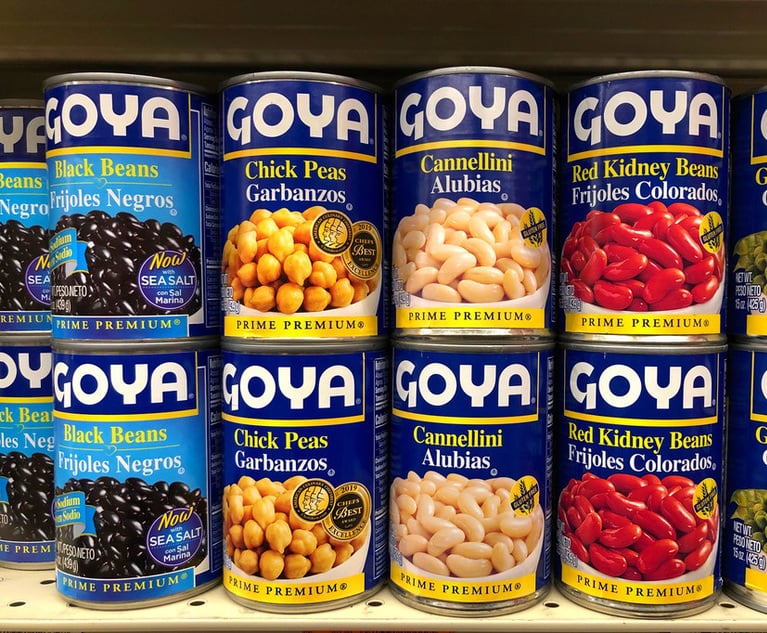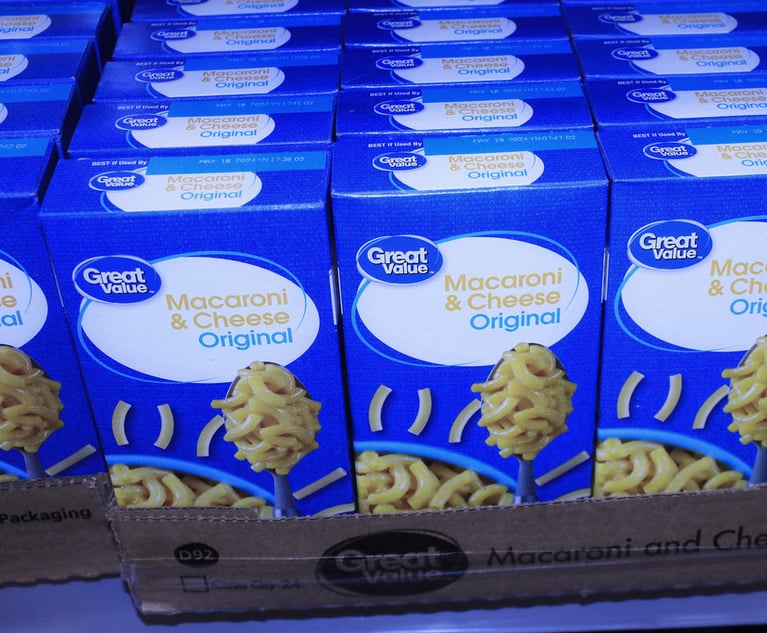 Impossible Burger with french fries. A 4-ounce Impossible patty with American cheese, lettuce, onion, and fresh tomato served at Umami Burger's King Street location.
Impossible Burger with french fries. A 4-ounce Impossible patty with American cheese, lettuce, onion, and fresh tomato served at Umami Burger's King Street location. Food and Beverage Labeling Litigation: Recent Trends
Recent months presented food and beverage manufacturers, class action plaintiffs, and regulators with myriad new labeling issues.
April 02, 2021 at 11:45 AM
9 minute read
The COVID-19 pandemic that upended the country last year put health even more top of mind for individuals, and food labeling litigation and regulation has reflected novel developments consistent with consumers' increased focus on healthy products. From the rollout of plant-based proteins that test our understanding of what it means to be "meat," elixirs masquerading as cures for the virus, and new takes on what it means to be "all natural," recent months presented food and beverage manufacturers, class action plaintiffs, and regulators with myriad new labeling issues. The Biden administration is yet another factor likely to impact this area going forward, so the issues implicated in recent food labeling legal action—the conflict between labeling requirements and the First Amendment, the efficacy of administrative action versus private litigation, and the role of agency guidance—will remain relevant in the near future.
State Action Spurs Private Litigants
There can be no question that plant-based proteins are no longer just a niche market but have officially entered the mainstream. Beyond Meat's market cap climbed almost 800% within two months of its mid-2019 IPO (Carmen Reinicke, Beyond Meat extends its post-IPO surge to 734%, breaking the $200-a-share threshold for the first time (BYND), Business Insider (July 23, 2019)), McDonald's unveiled the "McPlant" sandwich in November 2020 (Danielle Wiener-Bronn, McDonald's announces new chicken sandwich and 'McPlant' burger, CNN Business (Nov. 10, 2020)), and Starbucks plans to roll out oat milk to every store in the nation by spring 2021, Adam Campbell-Schmitt, Starbucks Will Offer Oat Milk Nationwide Next Year, Food & Wine (Dec. 10, 2020)). With their growing popularity, however, has come increased attention to how these products must be labeled to avoid misleading consumers, including whether they can be labeled "meat" and "milk" without confusing consumers who may be expecting animal products.
This content has been archived. It is available through our partners, LexisNexis® and Bloomberg Law.
To view this content, please continue to their sites.
Not a Lexis Subscriber?
Subscribe Now
Not a Bloomberg Law Subscriber?
Subscribe Now
NOT FOR REPRINT
© 2025 ALM Global, LLC, All Rights Reserved. Request academic re-use from www.copyright.com. All other uses, submit a request to [email protected]. For more information visit Asset & Logo Licensing.
You Might Like
View All

NYC’s Oldest Deli Agrees to Update Bathrooms, Entrances to End ADA Charges
4 minute read
Ben & Jerry’s Accuses Corporate Parent of ‘Silencing’ Support for Palestinian Rights
3 minute read
Walmart Accused of Misrepresenting 'Cheese' Ingredients in Great Value's Macaroni & Cheese
3 minute readLaw Firms Mentioned
Trending Stories
- 1Reviewing Judge Merchan's Unconditional Discharge
- 2With New Civil Jury Selection Rule, Litigants Should Carefully Weigh Waiver Risks
- 3Young Lawyers Become Old(er) Lawyers
- 4Caught In the In Between: A Legal Roadmap for the Sandwich Generation
- 5Top 10 Developments, Lessons, and Reminders of 2024
Who Got The Work
J. Brugh Lower of Gibbons has entered an appearance for industrial equipment supplier Devco Corporation in a pending trademark infringement lawsuit. The suit, accusing the defendant of selling knock-off Graco products, was filed Dec. 18 in New Jersey District Court by Rivkin Radler on behalf of Graco Inc. and Graco Minnesota. The case, assigned to U.S. District Judge Zahid N. Quraishi, is 3:24-cv-11294, Graco Inc. et al v. Devco Corporation.
Who Got The Work
Rebecca Maller-Stein and Kent A. Yalowitz of Arnold & Porter Kaye Scholer have entered their appearances for Hanaco Venture Capital and its executives, Lior Prosor and David Frankel, in a pending securities lawsuit. The action, filed on Dec. 24 in New York Southern District Court by Zell, Aron & Co. on behalf of Goldeneye Advisors, accuses the defendants of negligently and fraudulently managing the plaintiff's $1 million investment. The case, assigned to U.S. District Judge Vernon S. Broderick, is 1:24-cv-09918, Goldeneye Advisors, LLC v. Hanaco Venture Capital, Ltd. et al.
Who Got The Work
Attorneys from A&O Shearman has stepped in as defense counsel for Toronto-Dominion Bank and other defendants in a pending securities class action. The suit, filed Dec. 11 in New York Southern District Court by Bleichmar Fonti & Auld, accuses the defendants of concealing the bank's 'pervasive' deficiencies in regards to its compliance with the Bank Secrecy Act and the quality of its anti-money laundering controls. The case, assigned to U.S. District Judge Arun Subramanian, is 1:24-cv-09445, Gonzalez v. The Toronto-Dominion Bank et al.
Who Got The Work
Crown Castle International, a Pennsylvania company providing shared communications infrastructure, has turned to Luke D. Wolf of Gordon Rees Scully Mansukhani to fend off a pending breach-of-contract lawsuit. The court action, filed Nov. 25 in Michigan Eastern District Court by Hooper Hathaway PC on behalf of The Town Residences LLC, accuses Crown Castle of failing to transfer approximately $30,000 in utility payments from T-Mobile in breach of a roof-top lease and assignment agreement. The case, assigned to U.S. District Judge Susan K. Declercq, is 2:24-cv-13131, The Town Residences LLC v. T-Mobile US, Inc. et al.
Who Got The Work
Wilfred P. Coronato and Daniel M. Schwartz of McCarter & English have stepped in as defense counsel to Electrolux Home Products Inc. in a pending product liability lawsuit. The court action, filed Nov. 26 in New York Eastern District Court by Poulos Lopiccolo PC and Nagel Rice LLP on behalf of David Stern, alleges that the defendant's refrigerators’ drawers and shelving repeatedly break and fall apart within months after purchase. The case, assigned to U.S. District Judge Joan M. Azrack, is 2:24-cv-08204, Stern v. Electrolux Home Products, Inc.
Featured Firms
Law Offices of Gary Martin Hays & Associates, P.C.
(470) 294-1674
Law Offices of Mark E. Salomone
(857) 444-6468
Smith & Hassler
(713) 739-1250






